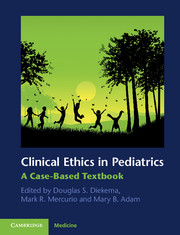Book contents
- Frontmatter
- Contents
- Contributors
- Preface
- Section 1 Core issues in clinical pediatric ethics
- Section 2 Ethical issues at the beginning of life: perinatology and neonatology
- Section 3 When a child dies: ethical issues at the end of life
- Section 4 Ethical issues posed by advances in medical technology and science
- 25 Minors as recipients and donors in solid organ transplantation
- 26 Enhancement technologies and children
- 27 Cochlear implants and deaf children
- 28 Ethical issues in the treatment of pediatric patients with disorders of sex development
- 29 Sterilizing procedures in minors with cognitive disabilities
- 30 Parental requests for intervention in children with lethal conditions
- 31 Genetic testing and screening of minors
- 32 The introduction of innovative technology into practice
- 33 Human subjects research involving children
- Section 5 Children, public health, and justice
- Section 6 Special topics in pediatric ethics
- Index
- References
29 - Sterilizing procedures in minors with cognitive disabilities
from Section 4 - Ethical issues posed by advances in medical technology and science
Published online by Cambridge University Press: 07 October 2011
- Frontmatter
- Contents
- Contributors
- Preface
- Section 1 Core issues in clinical pediatric ethics
- Section 2 Ethical issues at the beginning of life: perinatology and neonatology
- Section 3 When a child dies: ethical issues at the end of life
- Section 4 Ethical issues posed by advances in medical technology and science
- 25 Minors as recipients and donors in solid organ transplantation
- 26 Enhancement technologies and children
- 27 Cochlear implants and deaf children
- 28 Ethical issues in the treatment of pediatric patients with disorders of sex development
- 29 Sterilizing procedures in minors with cognitive disabilities
- 30 Parental requests for intervention in children with lethal conditions
- 31 Genetic testing and screening of minors
- 32 The introduction of innovative technology into practice
- 33 Human subjects research involving children
- Section 5 Children, public health, and justice
- Section 6 Special topics in pediatric ethics
- Index
- References
Summary
Case narrative
Sherry is a 14-year-old who was born with a chromosomal interstitial deletion and diagnosed with autism and moderate mental retardation (IQ measured at 45, adaptive functioning range averaging about a 4-year-old level, but with a wide range of abilities). She lives at home with her parents and attends a full-time special education classroom at her local public school. Her adaptive abilities include feeding herself but not preparing meals, and dressing herself but not choosing appropriate clothing. Her vocabulary includes about 20 rarely used words, and she generally communicates with sounds and emotive vocalization. She wears adult diapers and remains incompletely toilet trained in spite of extensive training efforts at home and school. Despite extensive behavioral training, she will sometimes smear feces if not changed promptly. Menarche began about a year ago, and she has had inconsistent menstrual periods over the past year, with bleeding lasting 3–10 days. Training to use pads has been unsuccessful, and she will sometimes take them off and smear blood. Her school now refuses to allow her to attend during her menstrual periods because of the management difficulty and blood exposure to other students and staff. During her menstrual periods she seems to have significant pain, and shows behavior changes including increased aggression, social withdrawal, and refusal to cooperate. She has also shown an increase in sexual behavior in the past several months, including two episodes of removing her clothes on the school bus, masturbating in public, and spending increased time with one particular boy that includes holding hands and stroking arms.
Sherry’s parents consulted with her pediatrician who suggested that they consider a hysterectomy to help with both menstrual management and prevention of pregnancy. The pediatrician referred her to an obstetrician/gynecologist and the ethics committee. The parents have articulated their concerns as:
Sherry shows an increase in sexual behavior, and they are concerned that she could become pregnant (a consulting geneticist says this is possible), and this would be awful for both Sherry and the unborn child.
Her periods have had a strong negative impact on her behavior and ability to take part in activities, especially school.
The increased aggression during her periods has raised questions about their continued ability to care for her at home.
While they intend to care for her at home as long as they are physically able to do so, they worry about the long-term risks for sexual abuse and pregnancy, if she ends up living in a group home or institution after they can no longer care for her at home.
- Type
- Chapter
- Information
- Clinical Ethics in PediatricsA Case-Based Textbook, pp. 166 - 173Publisher: Cambridge University PressPrint publication year: 2011

